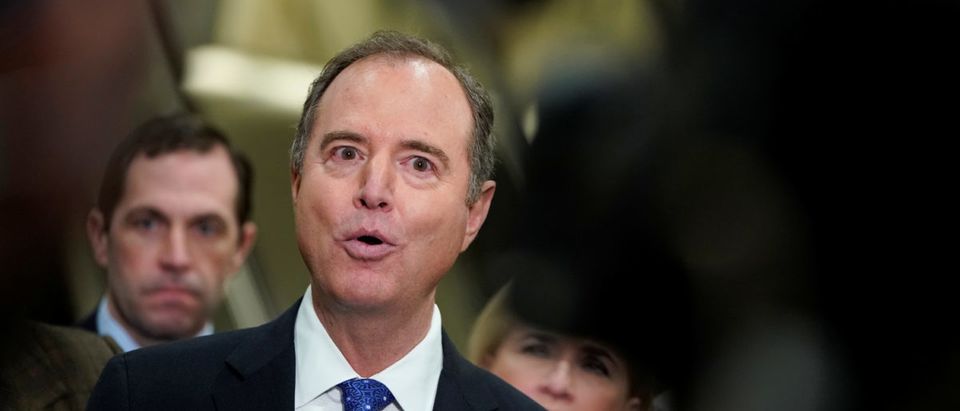The Constitution and our civil rights have been casualties of the partisan Left’s assault on President Trump. Rep. Adam Schiff’s “Ukraine call” impeachment investigation of Trump included controversial and, as best as I can tell, unprecedented secret subpoenas issued for phone records, including those of Rudy Giuliani, Trump’s lawyer. The subpoenas led to the publication of the private phone records of Giuliani, Congressman Devin Nunes, journalist John Solomon, Trump attorney Jay Sekulow, attorney Victoria Toensing, and other American citizens.
In December 2019, Judicial Watch filed a federal lawsuit against Schiff and the House Intelligence Committee under the public’s common-law right of public access to examine government records after it received no response to our December 6, 2019, records request for subpoenas and related records. As our legal team put it in our lawsuit, “The records are of critical public importance as the subpoenas were issued without any lawful basis and violated the rights of numerous private citizens.”
In response, Schiff’s House lawyers claimed a smorgasbord of secrecy excuses: “sovereign immunity;” “Speech or Debate Clause” privilege; immunity from the Freedom of Information Act and transparency law. They claimed that the records are secret, and that Judicial Watch and the public do not need to see them.
Unfortunately, the resulting federal district court decision suggested that Schiff and the House have “absolute” immunity from inquiries about the subpoenas. As I noted at the time:
“Adam Schiff secretly subpoenaed, without court authorization, the phone records of Rudy Giuliani and then published the phone records of innocent Americans, including President Trump’s lawyers, a member of Congress, and a journalist. And now a federal court ruled today that Schiff, or any member of Congress can’t be held accountable for this unprecedented and potentially criminal abuse of power. Every American should be concerned about a ruling that suggests Congress has unlimited power to take and publish their private phone records!”
Judicial Watch appealed the ruling and an appellate panel here in DC heard oral argument last month. The transcript is worth a read.
Judicial Watch senior attorney James Peterson argued to the three-judge panel:
“This case is about shedding light on unprecedented and illegitimate congressional subpoenas. The extraordinary subpoenas at issue represent a supposedly unlimited government surveillance power and an unlimited ability by Congress to, at their whim, to invade the privacy of any American.
***
Congressman Schiff secretly subpoenaed the phone records of a number of private citizens from telephone companies. He did not provide notice to these individuals in advance that their phone records were being sought. He did not subpoena the phone records directly from the citizens. Instead, he subpoenaed the phone companies for the records, preventing any opportunity for the private citizens to seek court review, as would happen in any other case in which the government is seeking this kind of information about any citizen.”
In response to a House attorney’s argument that the materials be kept secret to protect the privacy of the targets of the subpoenas, one of the appellate judges remarked:
“Well, I do think it’s, if not ironic, noteworthy that one of the interests you’ve just put forward is the invasion of privacy when the whole claim of Judicial Watch is that this Committee invaded the privacy of private citizens in the first place.”
The House’s lawyer suggested an “unlimited” power by Congress to issue subpoenas secretly and unaccountably without any court review:
“Court: So is there any limitation to this principle, then? Can a subpoena be issued for any information and that can’t be beyond the scope of the Speech and Debate Clause protection?
House Attorney: No, Your Honor, I don’t think there is any subpoena that cannot be beyond the scope.”
The Pelosi/Schiff House asserts it has an unlimited government surveillance power and an unlimited ability to invade the privacy of any American with zero accountability and transparency. The courts should reject Adam Schiff and Nancy Pelosi’s corrupt cover-up of the unconstitutional subpoenas that abused the civil rights of then-President Trump, Rudy Giuliani, journalists, and other American citizens. Congress is asserting a surveillance power no other government entity currently enjoys.
Although the legacy media to date has remained uninterested by abuses of civil liberties that may have occurred to conservatives, I suspect we’ll hear in a month or two whether the DC Circuit panel will uphold this new congressional power to secretly subpoena and publish the records of American citizens.
Tom Fitton is president of Judicial Watch, a nonprofit government watchdog.


